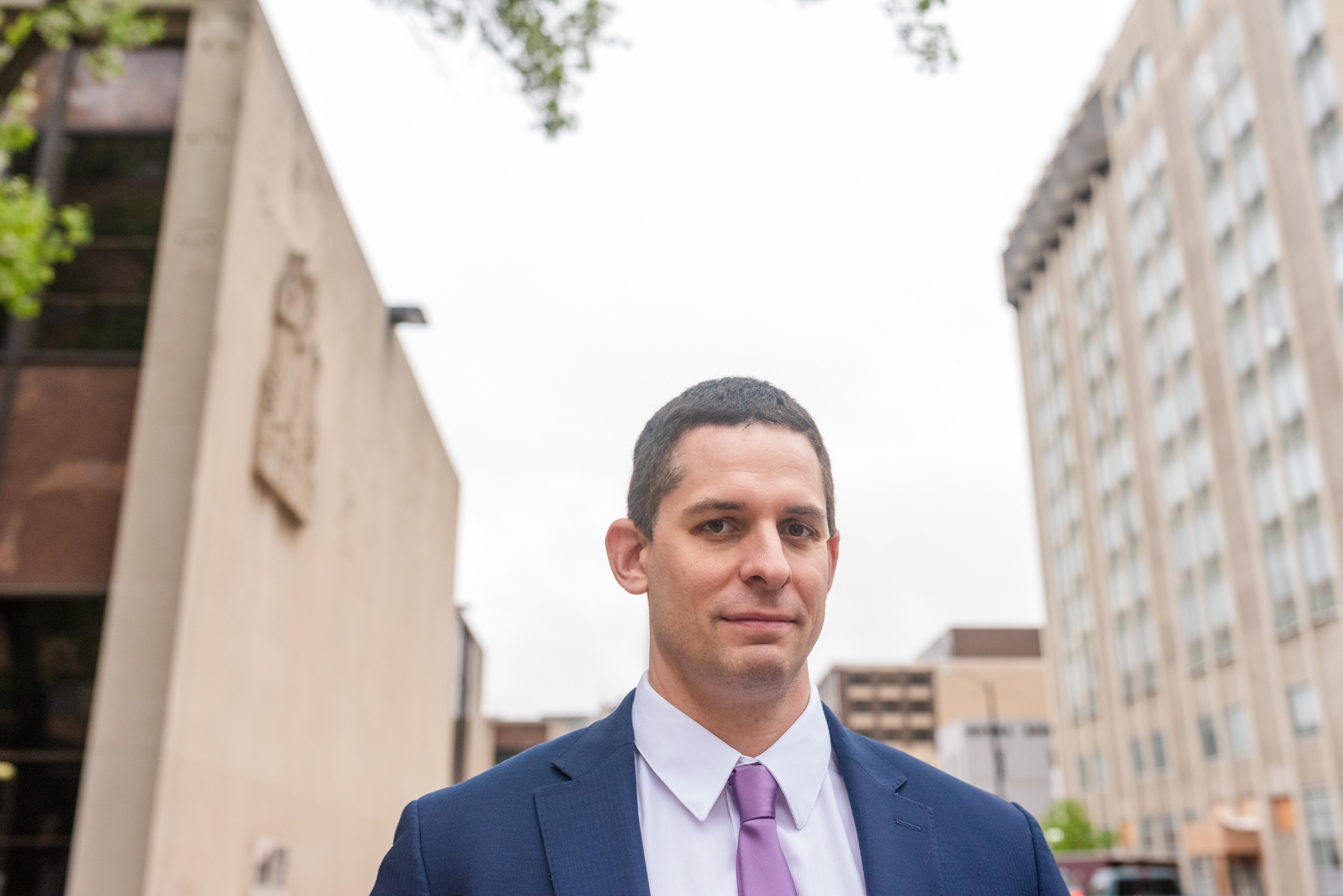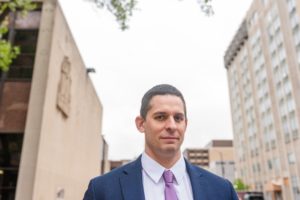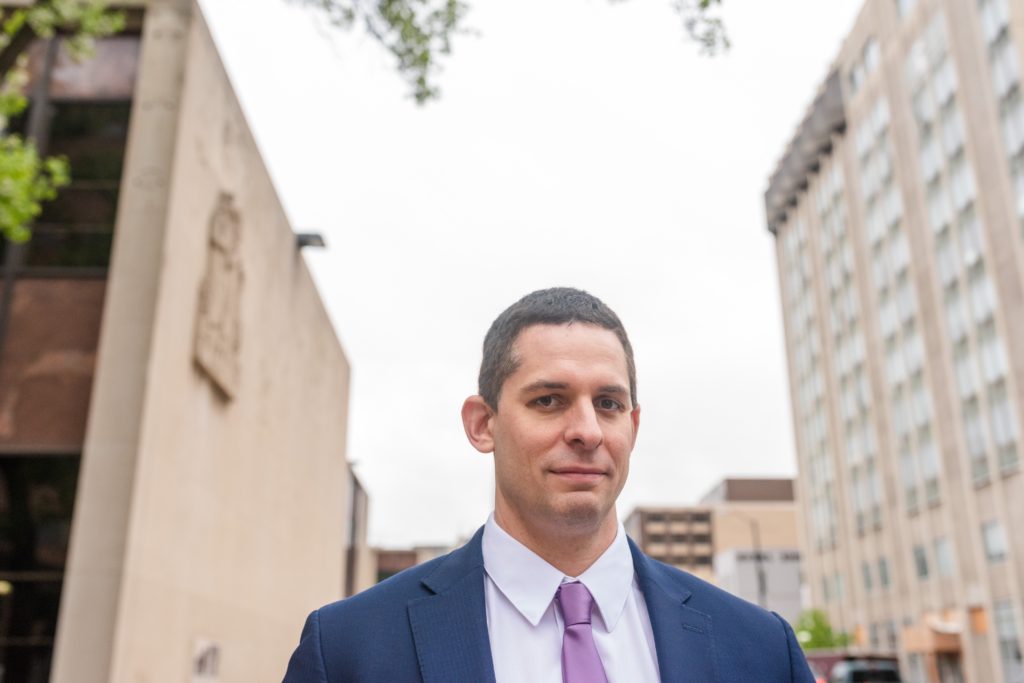

Eli Savit, who graduated in 2010 from the University of Michigan Law School, is an adjunct professor at the law school and works as a municipal attorney and senior advisor to Detroit Mayor Mike Duggan. His areas of legal specialty are civil rights, state and municipal litigation, and appellate and Supreme Court litigation.
Before advising Duggan, Savit was able to experience the inner workings of the U.S. Supreme Court when he clerked for Justice Ruth Bader Ginsberg and Retired Justice Sandra Day O’Connor. Savit has written extensively on the Environmental Protection Agency, Michigan administrative laws, and municipal employment laws.
He grew up in Ann Arbor and played high school and college basketball. In his work with the mayor, he regularly works with a team of lawyers, data scientists, and law enforcement professionals. Savit recently spoke with us about his education and his law career.
I bet no day is the same in your job as senior legal advisor to the city of Detroit. Tell me about your role there.
Savit: You’re right, every day is different. I oversee a lot of issues for the mayor and for the city. A big part of my portfolio is, I lead or direct a lot of our major lawsuits against banks and land speculators that are hurting Detroit citizens. I work on right to literacy on behalf of Detroit school children. I’ve overseen major negotiations for the city of Detroit and helped manage the huge international relationship between us and Canada. And then, I’m just a general legal advisor. The great thing about my job is, I sort of get to do it all.
To outsiders, the Supreme Court seems like such a mystery. What was it like clerking for Sandra Day O’Connor and Ruth Bader Ginsburg?
Savit: I think in many ways, I am one of the luckiest people in the world to have worked with the first two women who served. Ruth Bader Ginsburg is a kind and thoughtful person, but also a brilliant legal mind. She left her mark on Constitutional law by enshrining women’s rights before she was even on the court and it was an honor going to work for her every day. Sandra Day O’ Connor is just such a warm person. When I walked into my interview with her, I was incredibly nervous of course. And she immediately put me at ease. Within a minute of meeting her, all the nervousness fell away. She has that effect on everybody. She exhibits a sincere interest in other people, and from the time I started my clerkship with her, she was always so interested in what I was doing next. She said, ‘Look, the most interesting jobs I’ve had were in government.’ And she was a big proponent of me doing that, too. She thought it was a path to fulfillment, and I have no doubt she brought a lot of charm into whatever local government office she entered. I never thought I’d be a municipal lawyer, but here I am. I go where I can do the most good and that’s here.
I understand you worked with Eric Schwartz, a Ross School of Marketing professor, to develop a campaign to get the right kind of candidates to apply for law enforcement jobs in Detroit. Who are the right kinds of candidates and how do you reach them?
Savit: This was the exact question we were seeking to answer. For one thing, you want a police force that reflects the community. You want people who have ties to the community. You also want racially, ethnically, and linguistically diverse officers. It’s also important that we have more female officers on the force. Female officers can do a much better job of connecting with the victim in cases of domestic violence. We’ve also been told that it is much better to have officers with experience than to have newer officers. Officers with experience are much less likely to overreact or have a situation that spirals out of control. Now, as you can imagine, we are struggling to retain officers in Detroit where policing really is a tough job. Professor Schwartz was gracious enough to offer his services. He put together a series of Facebook and Instagram ads that showed police officers working, really showing the breadth of the different kinds of police work officers do. He had students help create the ads, some modeled in the ads, and its ongoing research, too. It’s going to be a great data set that we can use for recruitment and to improve officer retention.
You are now teaching in the law school where you graduated. How does your experience as a student inform your work as a teacher?
Savit: Well, I gravitated to substantive courses with real world relevance, and I definitely try to do that in the classes I teach. Especially in my Detroit Litigation Advocacy Workshop. I want to bring to my students, not just abstract topics, but rather what you can see you how your work impacts those on the ground.
You do so many different things, your days must be incredibly busy. How do you balance everything?
Savit: The short answer is, you just do. But there is a symbiotic relationship between me and my students. In my Detroit Litigation Advocacy Workshop, students get to help out with lawsuits (from his job with the city of Detroit). I need to give credit where credit is due for that name, DLAW. It came from Helen Marie Berg, a 2018 law school graduate. The students are really smart and full of energy and they identify issues and write white papers that we actually use. So the work they do is very real and they know that. I love being with students who are passionate about what they are learning.
What’s left for you to do. What is your big reach? Your big goal?
Savit: I don’t live life that way. I never thought my career would have unfolded the way it has, but I’ve had the opportunity to work on projects that I think have made the world a better place. I never thought I’d be a municipal lawyer, but when the opportunity came up, I took it. And that’s how I’ve always tried to live my life. To go where I can do the most good.


